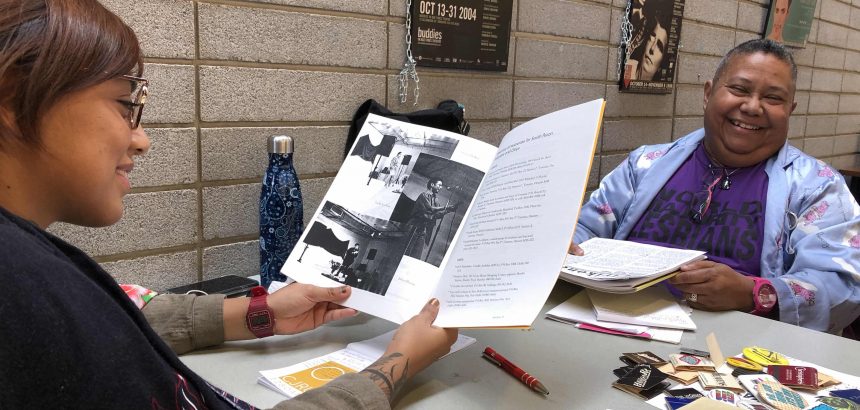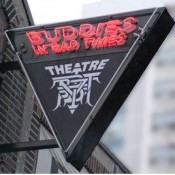In the second episode of The Youth/Elders Podcast, we explore histories of queer activism through first-hand accounts, as well as conversations around where we’ve been, and where we’re going, within our queer communities.
The episode opens with one man’s account of being involved in the Toronto bathhouse raids of 1981. Human rights lawyer Lisa Amin and theatre artist Greg Campbell share some reflections on queer community organizing in both Toronto and Montreal, before a larger group discusses the ramifications of Pride Toronto’s 2018 decision to invite the Toronto Police to apply to march in the parade. Last, we hear from a woman who worked as a police officer in New York City about how this role allowed her to be witness to various social movements at a time when she was not out on the job.
GLOSSARY + ADDITIONAL READING
Here are some of the references, and local Toronto terms you’ll come across in the episode, with links to more reading:
- 52 Division: Toronto Police Services 52 Division spans from Spadina to Yonge St, and from Bloor St south to the Toronto Islands. Their offices were the site of protest after both the 1981 bathhouse raids, and the 2000 Pussy Palace raid.
- ACT UP: Founded in 1987, ACT UP (AIDS Coalition to Release Power) is a diverse, non-partisan group of individuals united in anger and committed to direct action to end the AIDS crisis.
- BLM-TO: Black Lives Matter Toronto is a grassroots organization that seeks to “be a platform upon which black communities across Toronto can actively dismantle all forms of anti-black racism, liberate blackness, support black healing, affirm black existence, and create freedom to love and self- determine.”
- Cherry Beach: Cherry Beach is located just southeast of Toronto’s downtown core. It has a history as both a cruising spot and a site of police violence. Check out this article from Xtra that documents both.
- GOAL (Gay Officers Action League): Founded in 1982, GOAL is a New York-based organization that supports LGBTQ Law Enforcement Officers, seeks to educate non LGBTQ officers within the police force, and promotes a strong relatinonship between the police and the LGBTQ community.
- Montreal Raids: Prior to Toronto’s bathhouse raids, in 1977 a Montreal bar called Truxx was raided, and many were arrested and outed. This galvanized the community who protested the next day. An archival news piece is available on CBC’s archives.
- Toronto Bathhouse Raids / Operation SOAP: On February 5, 1981, four bathhouses in downtown Toronto were raided by 200 police officers, resulting in 286 men being charged as found-ins in a bawdy house. The mass arrests sparked outrage and mobilized Toronto’s queer community. You can watch raw footage of the resulting protest here, and read more about the impact of the raids on Toronto’s queer communities in this article by activist Tim McCaskell.
- Toronto Police apology: In 2016, Toronto Police Chief Mark Saunders apologized for the bathhouse raids of 1981. While significant and meaningful for many, the apology was not accepted by some members of the queer community – read an interview with one, here.
- Pride Toronto: Pride Toronto organizes Toronto’s annual Pride festival, including the Pride parade. Following a demonstration from Black Lives Matter in the 2016 parade, Pride banned the participation of uniformed police officers in the parade. After Pride invited Toronto Police Services to apply to march in the 2019 parade, the membership of the organization narrowly voted (163-161) to not invite them back.
- Pussy Palace Raid: In 2000 six male police officers raided a women’s bathhouse event at Club Toronto organized by the Toronto Women’s Bathhouse Committee. Over 350 women were in attendance, most of whom were naked at the time of the raid, which was performed under the guise of checking for liquor license infractions. More reading: The ArQuives’ Pussy Palace, a Brief Herstory
- Right to Privacy Committee: The Right to Privacy Committee was an advocacy group based in Toronto that challenged police harrassment of the queer community, and their authority to inspect properties. It was active from 1978-1991.
- Sister Vision Press: Founded in 1984 by Makeda Silvera and Stephanie Martin, Sister Vision Press was the first Canadian publishing house dedicated to the writing of Black women and women of colour. Check out this profile on the Rise Up Feminist Archive.
LISTEN, SUBSCRIBE, AND SHARE!
Read the full episode transcript here, and find the episode (and subscribe to the podcast) on Apple Podcasts, Google Music, Spotify, and Stitcher.
Hosted by Vanessa Dunn.
The Youth/Elders Podcast – for more information and to sign up for podcast updates, visit the podcast’s homepage at buddiesinbadtimes.com/podcast


